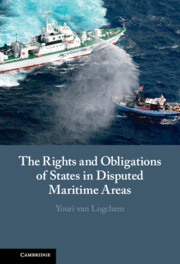Book contents
- The Rights and Obligations of States in Disputed Maritime Areas
- The Rights and Obligations of States in Disputed Maritime Areas
- Copyright page
- Contents
- Preface and Acknowledgements
- Cases
- Treaties and Legislation
- Abbreviations
- 1 Introduction
- 2 Disputed Maritime Areas: Setting the Scene
- 3 Disputed Maritime Areas: General Rules of International Law
- 4 Disputed Territorial Sea and Contiguous Zone Areas: Applicable Conventional Rules
- 5 Disputed EEZ and Continental Shelf Areas: Applicable Conventional Rules
- 6 Case Law Involving the Rights and Obligations of States in Disputed Maritime Areas
- 7 Disputed Waters Generated by Claims Made from Disputed Land Territory: What Are the Rights and Obligations of States?
- 8 Acts of Unilateralism in Disputed Maritime Areas: A Survey of State Practice
- 9 Are the Rights and Obligations of States in Disputed Maritime Areas Sufficiently Defined in International Law?
- Index
5 - Disputed EEZ and Continental Shelf Areas: Applicable Conventional Rules
Published online by Cambridge University Press: 01 October 2021
- The Rights and Obligations of States in Disputed Maritime Areas
- The Rights and Obligations of States in Disputed Maritime Areas
- Copyright page
- Contents
- Preface and Acknowledgements
- Cases
- Treaties and Legislation
- Abbreviations
- 1 Introduction
- 2 Disputed Maritime Areas: Setting the Scene
- 3 Disputed Maritime Areas: General Rules of International Law
- 4 Disputed Territorial Sea and Contiguous Zone Areas: Applicable Conventional Rules
- 5 Disputed EEZ and Continental Shelf Areas: Applicable Conventional Rules
- 6 Case Law Involving the Rights and Obligations of States in Disputed Maritime Areas
- 7 Disputed Waters Generated by Claims Made from Disputed Land Territory: What Are the Rights and Obligations of States?
- 8 Acts of Unilateralism in Disputed Maritime Areas: A Survey of State Practice
- 9 Are the Rights and Obligations of States in Disputed Maritime Areas Sufficiently Defined in International Law?
- Index
Summary
This chapter examines Article 6 1958 CSC and Articles 74(3) and 83(3) LOSC with a view towards ascertaining the extent to which these provisions set out a rule governing the conduct of unilateral activities in disputed EEZ and continental shelf areas. Article 6 1958 CSC, is the forerunner to the provision in the LOSC, is developed on the basis of equidistance: States are not entitled to extend their continental shelf beyond the equidistance boundary – that is, assuming there are no special circumstances. Articles 74(3)/83(3) LOSC lays down two obligations that are geared towards two different purposes: cooperation and abstention. The cooperative aspect is formed by the fact that States must seek provisional arrangements. The aspect of abstention is exemplified in that the States concerned must refrain from unilateral conduct that hampers or jeopardises EEZ/continental shelf delimitation. These two obligations arise conjointly in some, but not all, disputed EEZ/continental shelf areas. A dual function underlies the obligation not to hamper or jeopardise: first, it places limitations on the scope for coastal States to actively undertake unilateral acts; and, second, the obligation curtails the ways in which States can respond to activities undertaken in a disputed area.
Keywords
- Type
- Chapter
- Information
- The Rights and Obligations of States in Disputed Maritime Areas , pp. 108 - 182Publisher: Cambridge University PressPrint publication year: 2021



